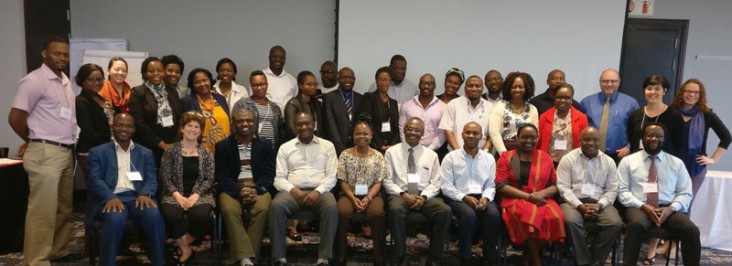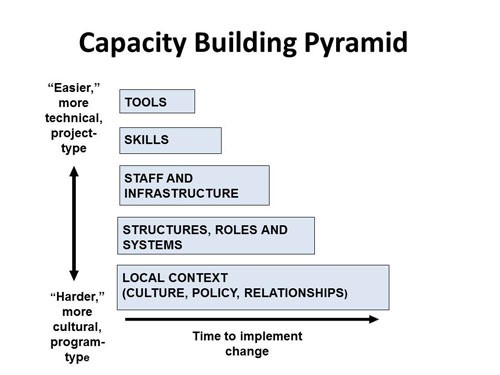- What We Do
- Agriculture and Food Security
- Democracy, Human Rights and Governance
- Economic Growth and Trade
- Education
- Ending Extreme Poverty
- Environment and Global Climate Change
- Gender Equality and Women's Empowerment
- Global Health
- Water and Sanitation
- Working in Crises and Conflict
- U.S. Global Development Lab


Aisha Yansaneh, PhD
Senior Research and Evaluation Advisor
Aisha Yansaneh is a Senior Research and Evaluation advisor within the U.S. Agency for International Development's (USAID's) Office of HIV/AIDS (OHA), where she provides technical assistance to the Research Division's Implementation Science portfolio and technical oversight to implementing partners for select research activities.
Recent Blog Posts
- It Takes a Village! Meeting Multiple Health and Development Needs of Girls and Young Women in Sub-Saharan Africa
Nagesh Borse - April 6, 2017 - Intriguing Insights from CROI 2017
Elizabeth Russell - February 28, 2017
Recently, I had the pleasure to represent OHA’s Research Division in a four-day workshop on research techniques to help guide how our partners implement HIV programs. The workshop, which took place in Johannesburg, South Africa, was organized by USAID’s Project SOAR, through the support of the U.S. President’s Emergency Plan for AIDS Relief (PEPFAR), and served one of our core research priorities: strengthening both individuals’ and institutions’ abilities to conduct research and use the findings to help country governments make program decisions. We call this “capacity strengthening,” and it is critical to creating effective and sustainable HIV and AIDS programs.
A key workshop goal was to provide valuable insights on how best to translate existing research into practical, effective solutions. Research conducted under Project SOAR contributes to PEPFAR’s targets, including providing evidence for meeting the Joint United Nations Programme on HIV/AIDS’ (UNAIDS’) ambitious 90-90-90 goals. Current Project SOAR research includes studies that look at how countries implement universal treatment guidelines for HIV-infected individuals, children and adolescents’ HIV treatment access and retention, and improving the way we measure HIV stigma and discrimination, as well as evaluating the impact of orphans and vulnerable children platforms on HIV outcomes and child well-being.
The workshop also helped to identify gaps in countries’ research capacity and how to best use existing resources to create a culture that fosters using HIV research findings to impact programs. Additionally, it served as a springboard to build research collaboration and research-to-use networks across countries. While a lot of valuable information was shared over the course of the four days, two lessons shared were particularly important.
A key innovation of the workshop included inviting local Project SOAR research investigators as well as local government partner co-investigators, which strengthened the linkages between the Project SOAR research and policy – highlighting the importance of engaging with key stakeholders early. Broad engagement of stakeholders at the national, regional and global level must happen throughout the research process: from design to data collection, to analysis, dissemination and how findings are used to influence programs and policy around the world. Strong stakeholder engagement speeds the adoption of research findings into programs and policies and ultimately accelerates their impact.

The workshop also featured the Capacity Building Pyramid (see graphic), which illustrated the steps and challenges faced in strengthening capacity. Many capacity-strengthening efforts are limited by inadequate attention to the base level. This base, which encompasses systems, structures and local context, can often be complicated and time consuming to incorporate effectively. Nonetheless, each of the pyramid levels needs to be taken into account to create effective and impactful HIV programs, often with special attention paid to the difficult systems-level factors.
As USAID continues applying implementation science to build evidence and improve program quality, effectiveness and efficiency, we need to renew our focus on building capacity and identifying innovative research utilization strategies to strengthen country programs.
I hope and trust that we build on this workshop and continue working hand-in-hand with local stakeholders to strengthen their research capabilities and capacity to better use evidence and apply it in HIV programs. Beyond this workshop, these are critical steps on our path aimed at ultimately ending the HIV and AIDS epidemic.
Additional Resources on network-based research capacity strengthening:
- Discover Human Heredity and Health in Africa (H3Africa) which aims to foster collaboration among African scientists.
- Find out more about the Medical/Nursing Education Partnership Initiative
- Learn more about the Wellcome Trials African Institutions Initiative
- Visit the World Health Organization/TDR Research Capacity Strengthening website







Add new comment